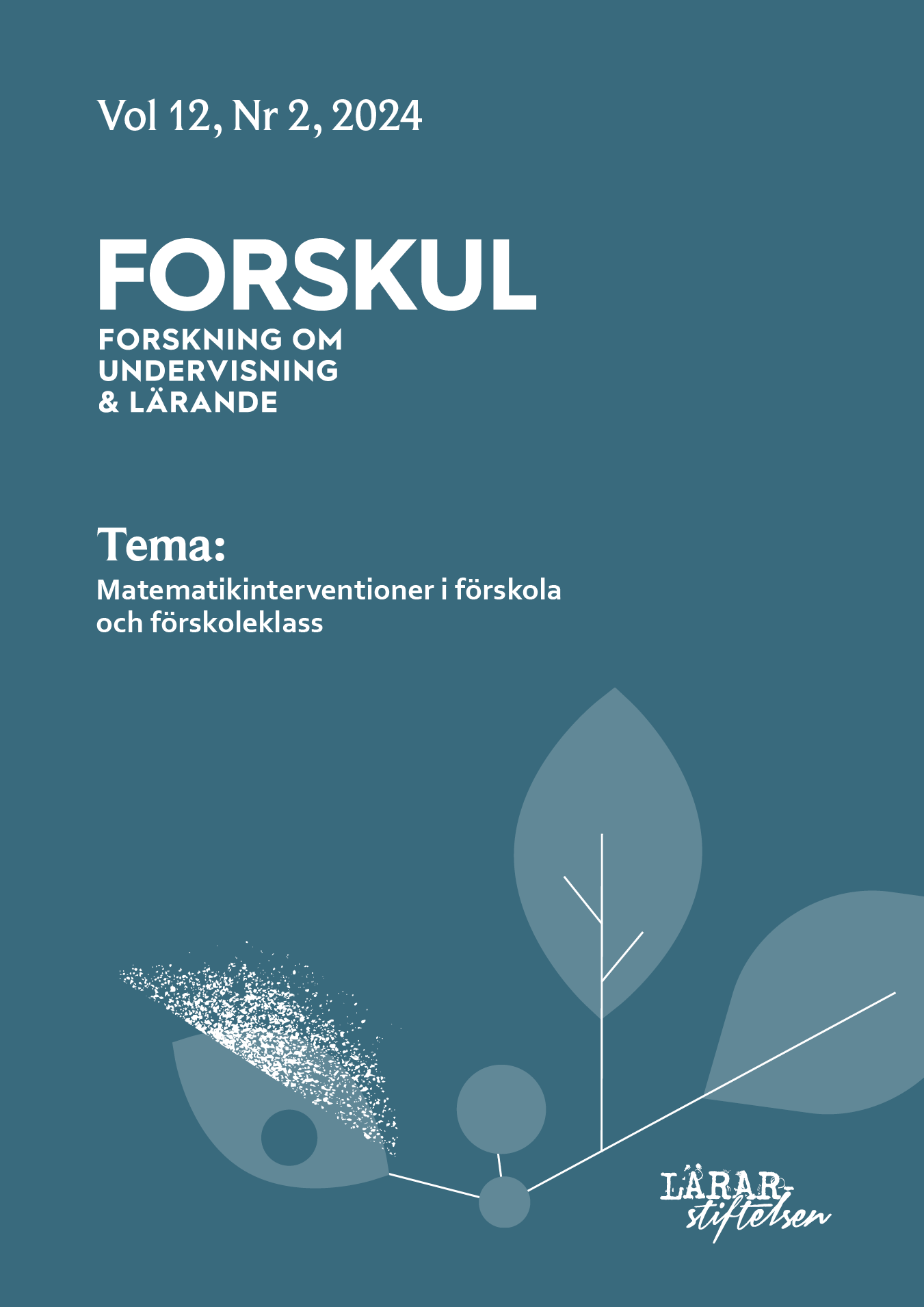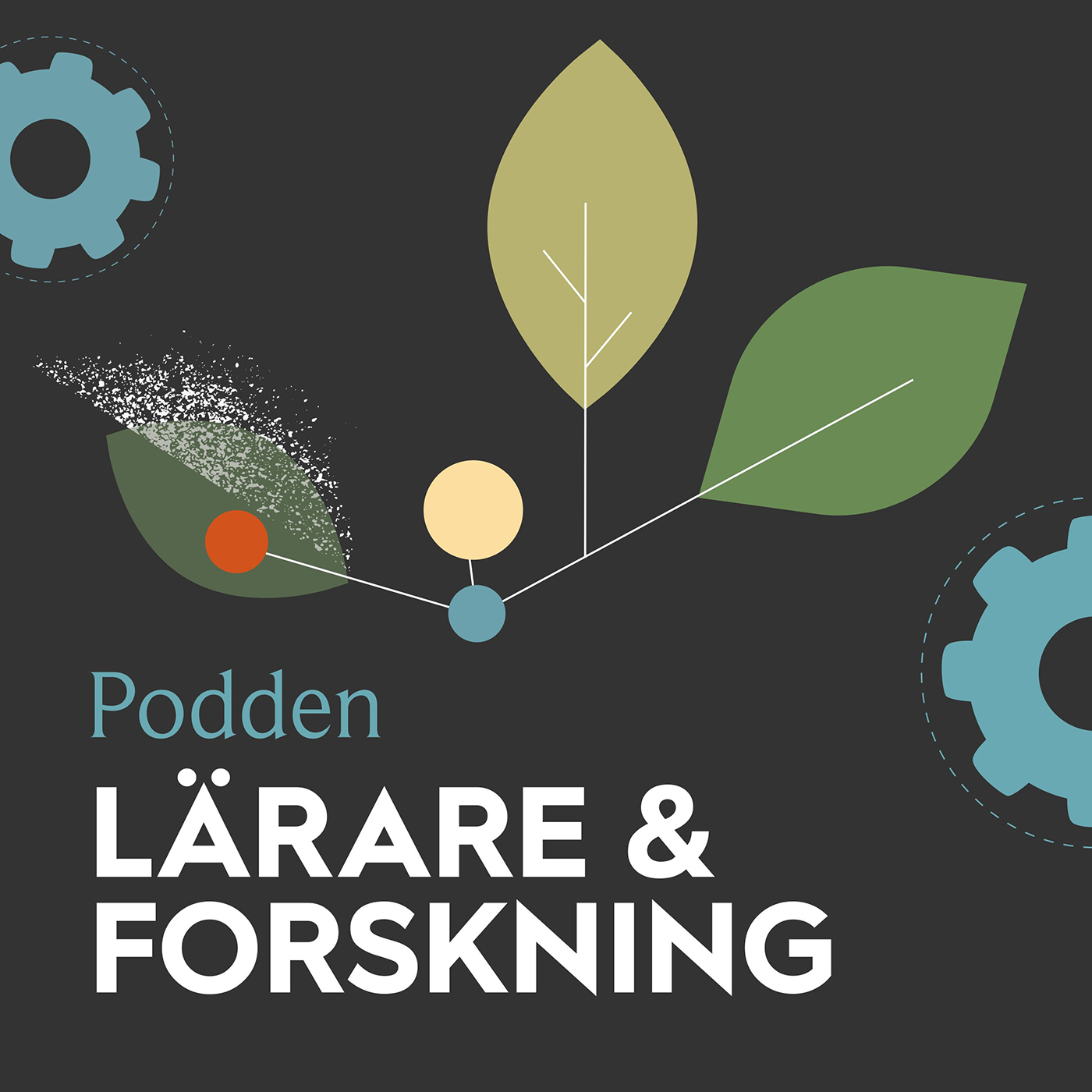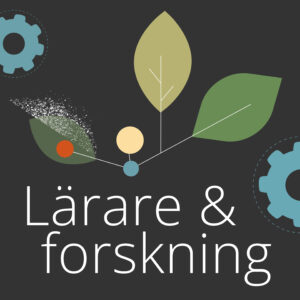Utveckling av matematikundervisning som främjar likvärdighet i förskoleklass
DOI:
https://doi.org/10.61998/forskul.v12i2.23887Nyckelord:
tidig matematikundervisning, designforskning, förskoleklass, likvärdighet, designprinciperAbstract
I den här artikeln presenteras en designstudie med målet att utforma en likvärdig matematikundervisning i förskoleklass i betydelsen att alla elever får tillgång till det matematiska innehållet och möjlighet att utveckla ett framgångsrikt förhållningssätt i och till matematikämnet. Designstudien är genomförd i en svensk kontext och tar utgångspunkt i den obligatoriska kartläggningen vid skolstart. Studien genomfördes av en förskoleklasslärare och två forskare som tillsammans planerade, genomförde och utvärderade matematikundervisning. Vid studiens start identifierades tre utvecklingsområden: instruktion, elevlösningar och talutrymme. För att möta dessa utvecklingsområden introducerades tre designprinciper: låg tröskel, öppna matematikuppgifter och resonemangsfrämjande repliker. I artikeln presenteras hur dessa designprinciper påverkade utvecklingsområdena i linje med designstudiens mål. Sammantaget visar resultaten utveckling av en matematikundervisning som möter elevers olikheter.
Developing mathematics education contributing to equity in preschool class
This article presents an educational design research study aiming to develop preschool class mathematics in line with equity. In the study, equity is defined as all students have access to mathematical content and opportunity to develop prosperous positions in and towards the subject. The design of the education was based on the mandatory assessment at the start of preschool class, one preschool class teacher and two researchers together planned, carried out, and evaluated the mathematics education. At the start of the study, three areas of development were identified: instruction, student solutions, and students’ verbal contributions. To address these areas of development, three design principles were introduced: low threshold, open-ended mathematical tasks, and prompts for reasoning. This article presents the way these design principles developed these areas of development in line with the goals of the study, that is, mathematics education that meets the diverse needs of students.
Referenser
Anderson, T. & Shattuck, J. (2012). Design-based research: A decade of progress in education research? Educational Researcher, 41(1), 16–25. https://doi.org/10.3102/0013189x11428813
Arnell, S. (2021). Elevers möten med matematik: En studie om elevers möten med matematik i förskoleklass och årskurs 1. [Doktorsavhandling, Linköpings Universitet]. DiVA. https://doi.org/10.3384/diss.diva-178029
Aunio, P., Hautamäki, J., Heiskari, P. & Van Luit, J. E. H. (2006). The early numeracy test in Finnish: Children's norms. Scandinavian Journal of Psychology, 47(5), 369–378. https://doi.org/https://doi.org/10.1111/j.1467-9450.2006.00538.x
Bagger, A. (2016). Quality and equity in the era of national testing: The case of Sweden. I World yearbook of education 2017 (s. 68–88). Routledge. https://doi.org/10.4324/9781315517377
Bagger, A., Vennberg, H. & Björklund Boistrup, L. (2019). The politics of early assessment in mathematics education. I U. T. Jankvist, M. van den Heuvel-Panhuizen & M. Veldhuis (Red.), Proceedings of the Eleventh Congress of the European Society for Research in Mathematics Education (s. 1831–1838). Freudenthal Group & Freudenthal Institute, Utrecht University and ERME.
Björklund, C., Elofsson, J., Ekdahl, A.-L., Kullberg, A., Alkhede, M. & Runesson Kempe, U. (2022). Kartläggning av matematikundervisning om tal i förskoleklass. Göteborgs Universitet. https://www.gu.se/sites/default/files/2022-05/SATSA_kartläggning.pdf
Björklund, C. & Elofsson, J. (2024). The appearance of playfulness in Swedish preschool class mathematics teaching. I H. Palmér, C. Björklund, E. Reikerås & J. Elofsson (Red.), Teaching mathematics as to be meaningful – Foregrounding play and children’s perspectives. Springer. https://doi.org/10.1007/978-3-031-37663-4_18
Blossing, U. & Söderström, Å. (2013). A school for every child in Sweden. I U. Blossing, G. Imsen & L. Moos (Red.), The Nordic education model (s. 17–34). Springer.
Boaler, J. (1998). Open and closed mathematics: Student experiences and understandings. Journal for Research in Mathematics Education, 29(1), 41–62. https://doi.org/10.2307/749717
Boaler, J. (2006). How a detracked mathematics approach promoted respect, responsibility, and high achievement. Theory Into Practice, 45(1), 40–46. https://doi.org/10.1207/s15430421tip4501_6
Boaler, J. (2008). Promoting 'relational equity' and high mathematics achievement through an innovative mixed-ability approach. British Educational Research Journal, 34(2), 167–194. https://doi.org/10.1080/01411920701532145
Boaler, J., Altendorff, L. & Kent, G. (2011). Mathematics and science inequalities in the United Kingdom: When elitism, sexism and culture collide. Oxford Review of Education, 37(4), 457–484. https://doi.org/10.1080/03054985.2011.595551
Boaler, J. & Staples, M. (2008). Creating mathematical futures through an equitable teaching approach: The case of railside school. Teachers College Record, 110(3), 608–645. https://doi.org/10.1177/016146810811000302
Boaler, J., Wiliam, D. & Brown, M. (2000). Students' experiences of ability grouping: Disaffection, polarisation and the construction of failure. British Educational Research Journal, 26(5), 631–648. http://www.jstor.org.www.bibproxy.du.se/stable/1501995
Borko, H. (2004). Professional development and teacher learning: Mapping the terrain. Educational Researcher, 33(8), 3–15. https://doi.org/10.3102/0013189x033008003
Buchholtz, N., Stuart, A. & Frønes, T. S. (2020). Equity, equality and diversity - Putting educational justice in the Nordic model to a test. I T. S. Frønes, A. Pettersen, J. Radišić & N. Buchholtz (Red.), Equity, equality and diversity in the Nordic model of education. Springer. https://doi.org/10.1007/978-3-030-61648-9
Burkhardt, H. & Schoenfeld, A. (2018). Assessment in the service of learning: Challenges and opportunities or plus ça change, plus c’est la même chose. ZDM, 50(4), 571–585. https://doi.org/10.1007/s11858-018-0937-1
Cazden, C. B. & Beck, S. W. (2003). Classroom discourse. I A. C. Graesser, M. A. Gernsbacher & S. R. Goldman (Red.), Handbook of discourse processes (s. 165–197). Lawrence Erlbaum Associates Publishers. https://doi.org/10.4324/9781410607348
Chapin, S. H., O'Connor, M. C. & Anderson, N. C. (2009). Classroom discussions: using math talk to help students learn. Math Solutions.
Cohen, E. G. E. & Lotan, R. A. E. (1997). Working for equity in heterogeneous classrooms: sociological theory in practice. Teachers College Press.
Dong, Y., Clements, D. H., Day-Hess, C. A., Sarama, J. & Dumas, D. (2021). Measuring early childhood mathematical cognition: Validating and equating two forms of the research-based early mathematics assessment. Journal of Psychoeducational Assessment, 39(8), 983–998. https://doi.org/10.1177/07342829211037195
Engle, R. A. & Conant, F. R. (2002). Guiding principles for fostering productive disciplinary engagement: Explaining an emergent argument in a community of learners classroom. Cognition and Instruction, 20(4), 399–483.
Ewing, B. (2006). 'Go to the page and work it from there': Young people's experiences of learning mathematics from a text. Australian Senior Mathematics Journal, 20(1), 8–14.
Franke, M. L. & Kazemi, E. (2001). Teaching as learning within a community of practice. I T. Wood, B. S. Nelson & J. E. Warfield (Red.), Beyond classical pedagogy. Routledge. https://doi.org/10.4324/9781410612335
Fraser, S. (2004). Doing research with children and young people. SAGE.
Gardesten, M. & Palmér, H. (2023). Students’ participation in mathematics in inclusive classrooms: A study of the enacted mathematical and relational knowing of teachers. Mathematical Thinking and Learning, 1–21. https://doi.org/10.1080/10986065.2023.2258485
Gauthier, L. (2016). Redesigning for student success: Cultivating communities of practice in a higher education classroom. Journal of the Scholarship of Teaching and Learning, 16(2), 1–13. https://doi.org/10.14434/josotl.v16i2.19196
Giota, J. & Emanuelsson, I. (2011). Specialpedagogiskt stöd, till vem och hur? Rektorers hantering av policyfrågor kring stödet i kommunala och fristående skolor. Göteborgs Universitet. https://gupea.ub.gu.se/bitstream/handle/2077/24569/gupea_2077_24569_1.pdf;jsessionid=A1D5F6643B31618052074416ECED308B?sequence=1
Goos, M. E. & Bennison, A. (2008). Developing a communal identity as beginning teachers of mathematics: Emergence of an online community of practice. Journal of Mathematics Teacher Education, 11(1), 41–60. https://doi.org/10.1007/s10857-007-9061-9
Greig, A., Taylor, J. & MacKay, T. (2013). Doing research with children: a practical guide (3 uppl.). SAGE.
Gutiérrez, J. F., Brown, S. A. & Alibali, M. W. (2018). Relational equity and mathematics learning: Mutual construction during collaborative problem solving. Journal of Numerical Cognition, 4(1), 159–187. https://doi.org/10.5964/jnc.v4i1.91
Hagland, K., Hedrén, R. & Taflin, E. (2005). Rika matematiska problem. Liber.
Helenius, O., Johansson, M. L., Lange, T., Meaney, T., Riesbeck, E. & Wernberg, A. (2016). When is young children’s play mathematical?. I T. Meaney, O. Helenius, M. Johansson, T. Lange & A. Wernberg (Red.), Mathematics education in the early years. Springer. https://doi.org/10.1007/978-3-319-23935-4_8
Hodges, T. E. & Cady, J. (2013). Blended-format professional development and the emergence of communities of practice. Mathematics Education Research Journal, 25(2), 299–316. https://doi.org/10.1007/s13394-012-0065-0
Kazemi, E. & Hintz, A. (2014). Intentional talk: how to structure and lead productive mathematical discussions. Stenhouse Publishers.
Llewellyn, A. & Mendick, H. (2011). Does every child count? Quality, equity and mathematics with/in neoliberalism. I B. Atweh, M. Graven, W. Secada & P. Valero (Red.), Mapping equity and quality in mathematics education (s. 49–62). Springer. https://doi.org/10.1007/978-90-481-9803-0_4
Maxwell, J. A. (2004). Causal explanation, qualitative research, and scientific inquiry in education. Educational Researcher, 33(2), 3–11. https://doi.org/10.3102/0013189x033002003
Margrain, V. & van Bommel, J. (2023). Assessment and gifted discourse in Swedish early years education steering documents: The problem of (in)visibility. Education Sciences, 13(9), 904. https://doi.org/https://doi.org/10.3390/educsci13090904
Mason, J. & Johnston-Wilder, S. (2006). Designing and using mathematical tasks. Tarquin Publications.
McKenney, S. E. & Reeves, T. C. (2019). Conducting educational design research (2 uppl.). Routledge.
Michaels, S. & O’Connor, C. (2015). Conceptualizing talk moves as tools: Professional development approaches for academically productive discussions. I B. R. Lauren, S. C. A. Christa & N. C. Sherice (Red.), Socializing intelligence through academic talk and dialogue (s. 347). American Educational Research Association. https://doi.org/10.3102/978-0-935302-43-1_27
Nic Mhuirí, S. (2014). Investigating student participation trajectories in a mathematical discourse community. I P. Liljedahl, S. Oesterle, C. Nicol & D. Allan (Red.), Proceedings of the Joint Meeting of PME 38 and PME-NA 36 (s. 297–304). Lebonfon.
Nortvedt, G. A. & Buchholtz, N. (2018). Assessment in mathematics education: Responding to issues regarding methodology, policy, and equity. ZDM, 50(4), 555–570. https://doi.org/10.1007/s11858-018-0963-z
O’Connor, C. & Michaels, S. (2017). Supporting teachers in taking up productive talk moves: The long road to professional learning at scale. International Journal of Educational Research, 97, 166-175. https://doi.org/10.1016/j.ijer.2017.11.003
Palmér, H. & Roos, H. (2017). What is implied when researchers claim to use a theory? International Journal of Research & Method in Education, 40(5), 471–479. https://doi.org/10.1080/1743727X.2016.1166487
Palmér, H. & van Bommel, J. (2020). Young students posing problem-solving tasks: What does posing a similar task imply to students? ZDM, 52(4), 743–752. https://doi.org/10.1007/s11858-020-01129-x
Palmér, H. & van Bommel, J. (2023). Young students exploring measurement through problem solving and problem posing. The Mathematics Educator, 31(1), 30–54.
Plomp, T. (2013). Educational design research: An introduction. I T. Plomp & N. Nieveen (Red.), Educational design research (s. 11–50). Netherlands Institute for Curriculum Development (SLO).
Pramling, N. & Pramling Samuelsson, I. (2008). Identifying and solving problems: Making sense of basic mathematics through storytelling in the preschool class. International Journal of Early Childhood, 40(1), 65–79. https://doi.org/10.1007/BF03168364
Pratt, N. & Back, J. (2009). Spaces to discuss mathematics: communities of practice on an online discussion board. Research in Mathematics Education, 11(2), 115–130. https://doi.org/10.1080/14794800903063323
Prediger, S., Gravemeijer, K. & Confrey, J. (2015). Design research with a focus on learning processes: An overview on achievements and challenges. ZDM, 47(6), 877–891. https://doi.org/10.1007/s11858-015-0722-3
Resnick, L. B., Michaels, S. & O’Connor, C. (2010). How (well structured) talk builds the mind. I D. Preiss & R. J. Sternberg (Red.), Innovations in educational psychology: perspectives on learning, teaching and human development (s. 163–194). Springer.
Ruef, J. L. & Shepard, R. (2022). Relational equity: Adapting an elementary mathematics teaching methods course to online contexts. International Electronic Journal of Mathematics Education, 17(4). https://doi.org/10.29333/iejme/12224
Schoenfeld, A. H. (2014). What makes for powerful classrooms, and how can we support teachers in creating them? A story of research and practice, productively intertwined. Educational Researcher, 43(8), 404–412. https://doi.org/10.3102/0013189X14554450
Schoenfeld, A. H. (2023). A theory of teaching. I A.-K. Praetorius & C. Y. Charalambous (Red.), Theorizing teaching: Current status and open issues (s. 159–187). Springer. https://doi.org/10.1007/978-3-031-25613-4_6
Scott, M. (2019). Supporting beginning teachers to engage in relational investigations of teaching and learning. I S. Otten, A. G. Candela, Z. de Araujo, C. Haines & C. Munter (Red.), Proceedings of the forty-first annual meeting of the North American Chapter of the International Group for the Psychology of Mathematics Education. University of Missouri.
Skolverket. (2009). Attityder till skolan 2009. Elevernas och lärarnas attityder till skolan. https://www.skolverket.se/publikationer?id=2385
Skolverket. (2023). Hitta matematiken: nationellt kartläggningsmaterial i matematiskt tänkande i förskoleklass. http://www.skolverket.se/undervisning/forskoleklassen/kartlaggning-i-forskoleklassen
Smith, M. S. & Stein, M. K. (2014). 5 undervisningspraktiker i matematik: för att planera och leda rika matematiska diskussioner (1 uppl.). Natur & kultur.
Stein, M. K., Engle, R. A., Smith, M. S. & Hughes, E. K. (2008). Orchestrating productive mathematical discussions: Five practices for helping teachers move beyond show and tell. Mathematical Thinking and Learning, 10(4), 313–340. https://doi.org/10.1080/10986060802229675
Sterner, G., Helenius, O. & Wallby, K. (2014). Tänka, resonera och räkna i förskoleklass. Nationellt centrum för matematikutbildning.
Sterner, G., Wolff, U. & Helenius, O. (2019). Reasoning about representations: Effects of an early math intervention. Scandinavian Journal of Educational Research, 1–19. https://doi.org/10.1080/00313831.2019.1600579
Sterner, G., Nagy, C. & Nyström, P. (2023). A scaled-up mathematics intervention in preschool classes. Scandinavian Journal of Educational Research, 1–11. https://doi.org/10.1080/00313831.2023.2250352
Sullivan, P., Warren, E. & White, P. (2000). Students’ responses to content specific open-ended mathematical tasks. Mathematics Education Research Journal, 12(1), 2–17. https://doi.org/10.1007/BF03217071
Utdanningsdirektoratet. (2017). Kartleggingsprøver i regning: veiledning til lærere.
van Bommel, J. & Palmér, H. (2021). Enhancing young children's understanding of a combinatorial task by using a duo of digital and physical artefacts. Early Years, 41(2-3), 218–231. https://doi.org/10.1080/09575146.2018.1501553
Vennberg, H. (2020). Att räkna med alla elever: Följa och främja matematiklärande i förskoleklass. [Doktorsavhandling, Umeå Universitet]. DiVA. http://urn.kb.se/resolve?urn=urn:nbn:se:umu:diva-168752
Vennberg, H. & Norqvist, M. (2018). Counting on: Long term effects of an early intervention programme. Proceedings of the 42nd Conference of the International Group for the Psychology of Mathematics Education (s. 355–362). PME.
Vetenskapsrådet. (2017). God forskningssed.
Walla, M. (2022). Diversity of assessment discourses in Swedish and Norwegian early mathematics education. Journal of Childhood, Education & Society, 3(2), 98–111. https://doi.org/10.37291/2717638X.202232178
Walla, M. (2023). Exploring the potential of using talk moves with young students when striving towards an equitable mathematics education. I P. Drijvers, C. Csapodi, H. Palmér, K. Gosztonyi & E. Kónya (Red.), Proceedings of the thirteenth congress of the European society for research in mathematics education (s. 2234–2241). Alfréd Rényi Institute of Mathematics and ERME.
Walla, M (2024). Diverse meanings ascribed to equity in early mathematics assessment. Education Inquiry, 1–17. https://doi.org/10.1080/20004508.2024.2316390
Wenger, E. (1998). Communities of practice: learning, meaning, and identity. Cambridge University Press.
Wu, H. (1994). The role of open-ended problems in mathematics education. The Journal of Mathematical Behavior, 13(1), 115–128. https://doi.org/10.1016/0732-3123(94)90044-2
Xenofontos, C. (2019). Equity and social justice in mathematics education. I C. Xenofontos (Red.), Equity in mathematics education: addressing a changing world. Information Age Publishing.
Publicerad
Referera så här
Nummer
Sektion
Kategorier
Licens
Copyright (c) 2024 Maria Walla, Hanna Palmér

Det här verket är licensierat under en Creative Commons Erkännande 4.0 Internationell-licens.
Författare till innehåll publicerat i Forskul behåller upphovsrätten till sina verk. Artiklar publiceras under villkoren i en Creative Commons-licens CC BY, som tillåter användning, nedladdning, distribution, länkning till och reproduktion i vilket medium som helst, förutsatt att originalverket är korrekt citerat.






